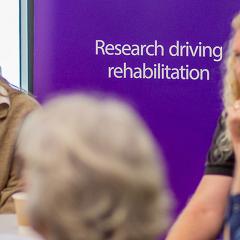What is the research about?
Our research explores whether a smartphone app that uses the global positioning system (GPS) can accurately measure how far people with long-term pain can walk in six minutes, compared to the conventional 6-minute walk test which requires in-person supervision. In this study we aimed to find out if this new method could be a reliable alternative, which could be especially useful when in-person tests are not possible. It also looked at whether the pain experienced during these tests differed between the two methods.
What did the researchers do?
Between October 2021 and August 2022, we recruited 36 individuals who experience persistent pain to participate in two versions of a 6-minute walk test: the conventional test conducted on a 30m shuttle track and another test using a GPS-based smartphone app while walking a circuit outdoors at a local park. We randomly selected which test participants performed first and, to reduce impact of fatigue, gave each participant a 15-minute rest before the second test. We compared the distance walked in both tests to assess the accuracy of the GPS method against the conventional test. Before conducting the study, we determined that if 95% of the tests gave walking distances within 100m of one another, then we would consider the two methods interchangeable. Additionally, we evaluated the participants' pain levels before and after each test using an 11-point numerical rating scale to compare the pain provoked by the two methods.
What did the researchers find?
Our findings revealed that the distance measured by the GPS-based smartphone app during the 6-minute walk test was on average 13.2 meters longer than the distance measured by the traditional method. However, the variability in measurements between the two methods exceeded our predefined acceptable limit of 100 meters, indicating that the GPS-based method cannot be considered interchangeable with the conventional approach for assessing functional exercise capacity in people with persistent pain.
What you need to know:
These findings are significant for both healthcare providers and individuals with persistent pain. During times when in-person assessments are not feasible, such as during the COVID-19 pandemic or in remote settings, the GPS-based 6-minute walk test offers healthcare providers a potential tool for remote monitoring of patients. Individuals with persistent pain may find the GPS-based method useful for assessing their own walking distance more frequently and without the need for hospital or clinic visits.
How can you use this research?
This research lays the groundwork for future studies aimed at refining and improving the accuracy of GPS-based exercise capacity assessments. These future research studies should focus on addressing the factors that contribute to the discrepancy between GPS-based and traditional measurements, as enhancing the precision of the GPS-based method could make it a more viable option for widespread use. The convenience and accessibility provided by GPS-based methods could significantly benefit healthcare providers and patients, allowing for remote monitoring and self-assessments without the need for travel. The findings underscore the importance of technological advancements in healthcare, providing a stepping stone towards more accessible and patient-centred care options.
About the researchers
Megan Murdoch
Dr Andrew Claus
Citation
Simmich J, Andrews N, Claus A, Murdoch M, Russell T. Assessing a GPS-Based 6-Minute Walk Test for People With Persistent Pain: Validation Study. JMIR Form Res 2024;8:e46820 URL: https://formative.jmir.org/2024/1/e46820 DOI: 10.2196/46820
Keywords
GPS; mobile apps; exercise test; pain; chronic pain
Contact information, acknowledgements
Joshua Simmich
RECOVER Injury Research Centre, The University of Queensland
Email: j.simmich@uq.edu.au
X: @JSimmich



